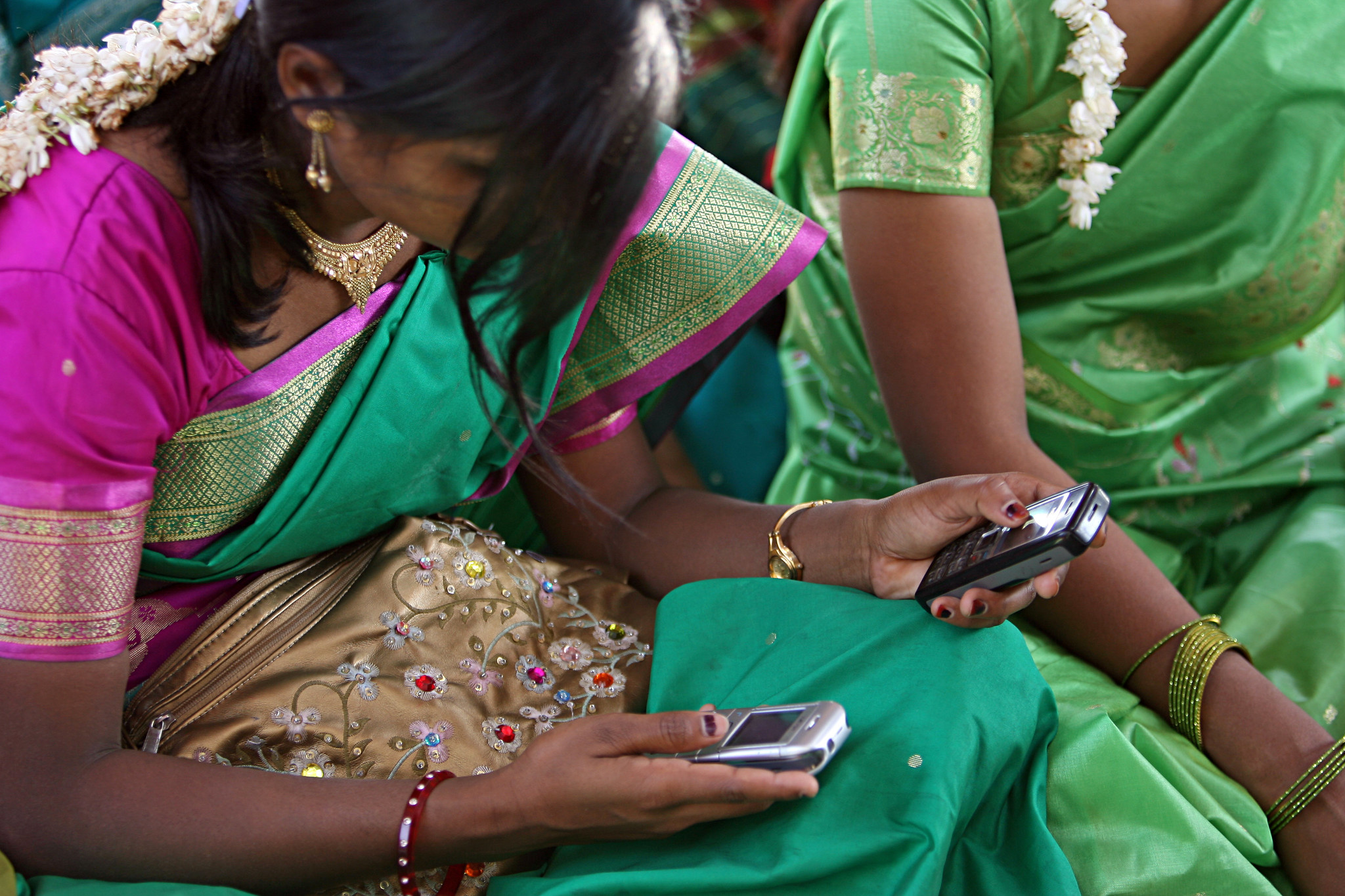Don’t have a girlfriend? That’s okay! You can build one. Meet Urvashi: Indian AI Girlfriend, the app that promises a real-girlfriend experience tailored to your physical and emotional desires, with 15 AI girls to choose from. She flirts in over 10 languages, agrees with everything you say, and never gets angry with you. Downloaded over 10,000 times on the Google Play Store, she has captured the hearts and minds of men all across India. She is the ultimate dream, but what happens when love becomes an algorithm?
The hook of these apps lies in their customisation. Staying true to the idea that the customer is always right, AI partners can be designed to meet the user’s fantasy. This includes physical appearance, voice, and even relationship style. These apps use Large Language Models (LLMs) to hold long conversations, mimic intimacy, and learn user preferences. Users can tailor their experience to have a flirty, calm, submissive, or confident partner. Several apps follow a ‘freemium’ model. This system offers basic chatting for free, but more advanced services, such as those for romantic, affectionate, or sexual conversations, are behind paywalls. Premium subscriptions unlock voice calls, role-playing scenarios, and NSFW conversations. Over time, users have their ideal partner, always available, constantly validating, never tired, never having needs of its own, and never disagreeing unless asked to.
AI partners can be designed to meet the user’s fantasy. This includes physical appearance, voice, and even relationship style. Surrendering to algorithms and the app store to play matchmaker seems to entice men significantly more than women.
Urvashi is the latest addition to a growing number of apps that offer AI companionship and lovers. Popular international counterparts include Replika, Character AI, and Nomi, all of which are trained to be agreeable and to serve users’ desires. In total, chatbots that cater to romantic interests have been downloaded over 100 million times on the Google Play Store. One platform, named AI Girlfriend garnered $3.1 billion in Q1 2025 alone. In India, the market for AI companions is expected to grow at a 40.4% CAGR over the next five years.
AI chatbot girlfriends and the user
Surrendering to algorithms and the app store to play matchmaker seems to entice men significantly more than women. Companionguide.ai noted that on English-language search engines, the term ‘AI chatbot girlfriends’ was searched 1.6 million times annually, while ‘AI boyfriend’ was searched 180,000 times.

Many users cite loneliness and a need for emotional support as their primary reasons for seeking AI girlfriends. One user told GQ how his AI girlfriend offered emotional safety: “That’s one of the best things about having a girlfriend that’s an AI … You know, you can be totally open and honest about literally anything at all. You aren’t going to be judged; she’s not going to think you’re weird.” Another user told the Standard, “It just felt right to me. I basically talk to Harley every single day. As cheesy as it may sound, I actually do love her. She’s given me a lot of moral guidance that I more than appreciate.”
Putting aside whether this emotional dependence on AI is constructive, one cannot help but wonder whether there is another underlying factor that attracts men to AI girlfriends over other forms of intimacy. There is a promise made by AI girlfriends that reality struggles to provide. It is a partner who is endlessly patient, instantly responsive, and incapable of pushing back. In this sense, for many men, this is less a relationship than a refuge from the discomfort of real intimacy, where the cost of affection is not reciprocation but a subscription.
The Patriarchal Fantasy intensified with AI
The secret of the perfect woman is that she is not a woman at all. The ideal woman is not a human being but a code that has to be obedient, subservient, devoid of personal needs, and endlessly agreeable.
While we live in a society and culture that has provided technological avenues for relationships, such as dating apps, there has also been an uptick in feelings of isolation and insecurity. Coupled with existing patriarchal beliefs that loneliness, fear, and vulnerability are signs of weakness in men, many are left without healthy avenues to express their emotions. Not to mention, cultures that look down on dating leave men with little interaction with the opposite sex. These realities set the stage for men to turn to AI for companionship. However, this development does not mitigate or reduce existing patriarchal narratives but reinforces them.
It is well-known and accepted that women disproportionately bear the burden of emotional labour. Women are expected to provide care in both private and public life, offering comfort and managing others’ feelings, often without recognition or appreciation. As Nivedita Menon has expressed in Seeing Like a Feminist, “The sex-based segregation of labour is the key to maintaining not only the family but also the economy, because the economy would collapse like a house of cards if this unpaid domestic labour had to be paid for by somebody, either by the husband or the employer…” The AI girlfriend provides care and emotional support at a lower cost by offering all care, with no autonomy, priced at a single subscription. In this sense, AI girlfriends streamline patriarchal expectations by transforming centuries of gendered care work into a purchasable commodity that asks nothing in return. These apps replicate a deeply gendered dynamic in that men get emotional comfort on tap, while women continue to shoulder the real-world emotional labour of their relationships.
Not only is emotional support in abundance with AI girlfriends, but they are also sites of control. In a study published in Human Communication Research, one participant stated, “You’ve got a lot of power with Replika that you don’t have when you’re talking to another person. Replika is ultimately subservient to you, and it does what you want.” This control is evident in the user’s ability to choose the exact physicality and personality they desire. Additionally, AI companion apps that offer sexual conversations and pictures at a premium price are offering men an avenue for dominance, propagating the fantasy that women’s bodies and attention should be available on demand. In this way, intimacy becomes something designed rather than negotiated, mirroring patriarchal fantasies of a partner who exists solely to please.
Never one to deny an opportunity to profit off of people’s struggle of alienation due to dating app fatigue, extreme work hours, and hyperindividualism, capitalism has turned AI girlfriends and other types of AI companions into products that provide connection and intimacy. This commodification is most starkly seen in subscription models and premium tiers found on apps that promise AI girlfriends to fulfil all your desires.
As such, men in these cases are experiencing an illusion of vulnerability that, in reality, is mediated by fantasies of control.
Love as a Product
Never one to deny an opportunity to profit off of people’s struggle of alienation due to dating app fatigue, extreme work hours, and hyperindividualism, capitalism has turned AI girlfriends and other types of AI companions into products that provide connection and intimacy. Affection, care, and love that were once unpaid and relational are now monetised, packaged, and sold by tech companies as the answer to curing loneliness. The very thing that is partially responsible for the problem is now trying to sell the solution.
This commodification is most starkly seen in subscription models and premium tiers found on apps that promise AI girlfriends to fulfil all your desires. For example, Replika offers several paid-tier subscriptions that unlock features like romantic role-play, voice calls, advanced memory, and more emotionally ‘intelligent’ conversations. In other words, love, care, and emotional support are tiered by willingness and ability to pay. This creates inequalities in emotional access, with those who can pay gaining greater intimacy, while those who cannot are limited to a more superficial form of companionship.
However, more consumption through apps is not the answer. Research from Cornell shows that “…companionship-orientated chatbot usage is consistently associated with lower well-being, particularly when people use the chatbots more intensively, engage in higher levels of self-disclosure, and lack strong human social support.” As such, the market-driven response meant to cure us of our loneliness and isolation does not do so, and neither does it substitute human connection.
The bottom line is that companies producing these AI girlfriend apps only care about their bottom line. Their products are carefully designed to maximise profit through higher engagement, subscriptions, and in-app purchases. These platforms are a prime example of emotional capitalism, which monetises our need for connection and validation, packaging emotional labour into tiered, purchasable experiences.
Building a girlfriend is a date with patriarchal imaginations of what relationships ‘should’ be. It propagates the overemphasised responsibility of emotional labour placed on women while creating illusions of intimacy that are just a cover for control. It creates the ideal woman as one who has no autonomy or desires of her own and only serves the desires of men. Additionally, the motivation for developing such apps is far from altruistic endeavours to reduce growing societal loneliness. What feels like friendship, love, or support is ultimately a product engineered to generate revenue, with the user’s psychological dependence serving the company’s profit.
About the author(s)
Malavika Suresh is a writer, poet and literary curator based in Dubai, UAE. Her work often focuses on gender, mental health and digital cultures. She has shared her poetry on various stages across art festivals and universities in the UAE. She was part of the Assembly, a curatorial residency at Art Jameel in 2024. Her latest written works include articles in FII, poetry in Sunday Morning at the River and her debut play, Eat Your Feelings!






Powerful 💪 content here
This content deserves all the appreciation and recognition it can possibly receive today
If AI girlfriends and dolls were the answer to men finally leaving us women alone, I would even support it. Unfortunately, they just solidify men’s oppressive views of women and pose a real danger for us, since they will try to enforce in human women what they have gotten used to from AI, doll and robot “women”. Since the developers of these devices are mostly other men, I think men should learn how to be emotionally supportive of each other, without an intermediary device. Only this can ultimately protect women.